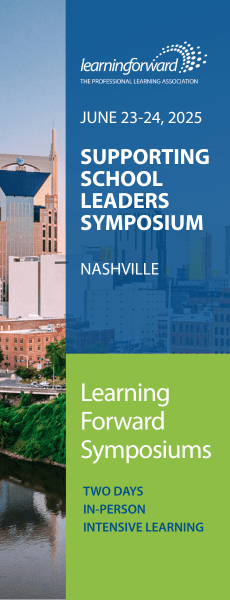Create A Safe Space To Learn
Probing encourages teachers to delve deep into their thinking
By Learning Forward
Categories: Collaboration, Facilitation, Learning designs, Reaching all studentsJune 2015
Read the remaining content with membership access. Join or log in below to continue.
Sed ut perspiciatis unde omnis iste natus error sit voluptatem accusantium doloremque laudantium, totam rem aperiam, eaque ipsa quae ab illo inventore veritatis et quasi architecto beatae vitae dicta sunt explicabo. Nemo enim ipsam voluptatem quia voluptas sit aspernatur aut odit aut fugit, sed quia consequuntur magni dolores eos qui ratione voluptatem sequi nesciunt. Neque porro quisquam est, qui dolorem ipsum quia dolor sit amet, consectetur, adipisci velit, sed quia non numquam eius modi tempora incidunt ut labore et dolore magnam aliquam quaerat voluptatem.
 In their book, The Collaborative Analysis of Student Learning: Professional Learning That Promotes Success for All (Corwin Press & Learning Forward, 2015), authors Amy B. Colton, Georgea M. Langer, and Loretta S. Goff outline a professional learning design that emphasizes collaborative inquiry with a focus on cultural diversity and equity. This article, which is adapted from the book, provides an in-depth look at one of the communication skills essential to the collaborative inquiry process.
In their book, The Collaborative Analysis of Student Learning: Professional Learning That Promotes Success for All (Corwin Press & Learning Forward, 2015), authors Amy B. Colton, Georgea M. Langer, and Loretta S. Goff outline a professional learning design that emphasizes collaborative inquiry with a focus on cultural diversity and equity. This article, which is adapted from the book, provides an in-depth look at one of the communication skills essential to the collaborative inquiry process.
Probing For Clarity
Listener asks the speaker to elaborate upon or add specific detail about what was said.
Purpose (intent)
Moves beyond vague language or generalizations.
Prompts the speaker to dig more deeply into his or her own thinking.
Helps the speaker to become more conscious of his or her thought processes.
Examples
Presenting teacher: “My students really struggle with writing.”
Group member: “What have you seen that tells you that they are struggling?”
Group member: “What specifically would you like to see in their writing that would represent improvement?”
Group member: “You mentioned that your students never show their work. How true is this for your entire class? Which ones do show their work?”
Group member: “You said you wanted to move your students from using manipulatives in mathematics to paper-and-pencil tasks. Tell me more about how you plan to do that.”
Group member: “So, we think that peer editing might be a helpful strategy for Joe. What might that look like, specifically? What do we need to think about to make it most effective?”
What is the Collaborative Analysis of Student Learning?
The Collaborative Analysis of Student Learning is a professional learning design in which teacher groups analyze student work samples and assessments to learn how to effectively support students’ learning of complex academic standards.
Teachers’ engagement in the process is driven by their relentless pursuit to discover and apply responsive approaches for learning so that every student reaches standards of excellence. This inquiry extends over a period of months “because deep learning rarely results from a single experience, and teachers need time to conduct longitudinal studies in which they test and reconstruct their current theories of what works” (Putnam & Borko, 2000). Through collaborative inquiry, teachers move away from using uniform best practices toward tailoring culturally and linguistically responsive approaches that meet all students’ needs.
Teacher self-awareness is an important part of developing culturally responsive approaches and positive attitudes about teaching and learning. Through structured and facilitated processes, teachers examine their beliefs and practices about teaching and learning. During study group sessions, teachers actively move beyond polite conversations of simply sharing practices toward more in-depth conversations, known as dialogue, about students whom teachers feel challenged to reach and teach (Little, Gearhart, Curry, & Kafka, 1999).
The process reveals assumptions that may limit teachers’ capacity to give full attention to students’ needs. A systematic inquiry process identifies, tests, analyzes, and refines potential solutions, allowing teachers to find equitable ways for all students to reach standards of excellence.
References
Costa A.L. & Garmston, R.J. (2002). Cognitive coaching: A foundation for renaissance schools (2nd ed.). Norwood, MA: Christopher-Gordon Publishers.
Garmston, R.J. & Wellman, B.M. (2009). The adaptive school: A sourcebook for developing collaborative groups (2nd ed.). Norwood, MA: Christopher-Gordon Publishers.
Little, J.W., Gearhart, M., Curry, M., & Kafka, J. (1999). Looking at student work for teacher learning, teacher community, and school reform. Phi Delta Kappan, 85, 184-192.
Putnam, R.T. & Borko, H. (2000, January/February). What do new views of knowledge and thinking have to say about research on teacher learning? Educational Researcher, 29(1), 4-15.
Learning Forward is the only professional association devoted exclusively to those who work in educator professional development. We help our members plan, implement, and measure high-quality professional learning so they can achieve success with their systems, schools, and students.
Categories: Collaboration, Facilitation, Learning designs, Reaching all students
Recent Issues
BUILDING BRIDGES
December 2024
Students benefit when educators bridge the continuum of professional...
CURRICULUM-BASED PROFESSIONAL LEARNING
October 2024
High-quality curriculum requires skilled educators to put it into...
LEARNING TO PIVOT
August 2024
Sometimes new information and situations call for major change. This issue...
GLOBAL PERSPECTIVES
June 2024
What does professional learning look like around the world? This issue...










